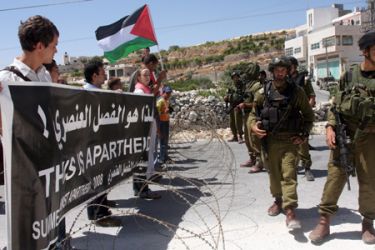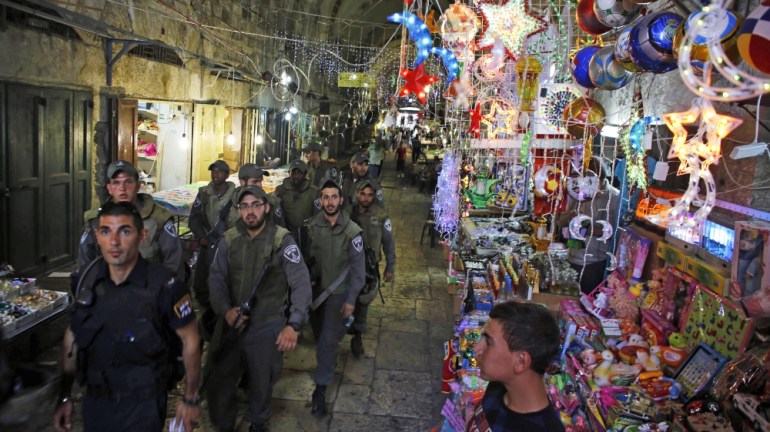‘This is apartheid’: Rights group slams Israeli rule
Israel executes laws, practices and state violence designed to cement supremacy of Jews over Palestinians, B’Tselem says.

A leading Israeli human rights group has begun describing Israel and its control of the Palestinian territories as a single “apartheid” government, using an explosive term that the country’s leaders and their supporters vehemently reject.
In a report released on Tuesday, B’Tselem said Israel has created a system in which Jewish citizens enjoy full rights, but Palestinians living in Israel’s four areas of control have different levels of rights – depending on where they live – are always below the Jewish people.
Keep reading
list of 4 itemsLove in times of Israeli apartheid
‘Applying apartheid’: Israel annexation plan denounced
Coronavirus outbreak in the time of apartheid
“One of the key points in our analysis is that this is a single geopolitical area ruled by one government,” said B’Tselem director Hagai El-Ad. “This is not democracy plus occupation. This is apartheid between the river and the sea.”
The report said Israel seeks to advance and cement Jewish supremacy throughout the entire area between the Jordan River and the Mediterranean Sea.
“To that end, it has divided the area into several units, each with a different set of rights for Palestinians – always inferior to the rights of Jews,” the report said.
As part of this policy, Palestinians are denied many rights, including the right to self-determination, the report added.
The four areas of Israeli control are the occupied West Bank where Palestinians live in dozens of disconnected enclaves under rigid military rule; occupied East Jerusalem where Palestinians are permanent residents but not citizens; the blockaded Gaza Strip which Israel continues to control externally; and Israel itself.
Israel has long presented itself as a thriving democracy and purported that its Palestinian citizens, who make up about 20 percent of its population of 9.2 million, have equal rights.
However, these Palestinians suffer from being treated as second- or third-class citizens at the institutional level, with some 60 laws that actively discriminate against them in sectors such as housing, education and healthcare.
The report went on to describe four methods used by Israel to advance Jewish supremacy: freedom of movement, political participation, exclusive immigration, and expropriating land for its Jewish citizens while crowding Palestinians in enclaves.
Israel’s harshest critics have used the term “apartheid” for decades, evoking the system of white rule and racial segregation in South Africa that was brought to an end in 1994. The International Criminal Court defines apartheid as an “institutionalised regime of systematic oppression and domination by one racial group”.
“There is no country in the world that is clearer in its apartheid policies than Israel,” said Nabil Shaath, a senior adviser to Palestinian Authority President Mahmoud Abbas. “It is a state based on racist decisions aimed at confiscating land, expelling indigenous people, demolishing homes and establishing settlements.”
Itay Milner, a spokesman for Israel’s consulate general in New York, dismissed the B’Tselem report as “another tool for them to promote their political agenda,” which he said was based on a “distorted ideological view”. He pointed out that Arab citizens of Israel are represented across the government, including the diplomatic corps.

Nation-state law and annexation
El-Ad points to two recent developments that altered B’Tselem’s thinking.
The first was a contentious law passed in 2018 that defines the right to exercise national self-determination in Israel as “unique to the Jewish people”. Palestinian citizens said the law is a culmination of years of institutional discrimination.
The second was Israel’s announcement in 2019 of its intention to annex up to a third of the occupied West Bank, including all of its Jewish settlements, which are home to nearly 500,000 Israelis. Those plans were put on hold as part a normalisation agreement reached with the United Arab Emirates last year but Israel has said the pause is only temporary.
B’Tselem and other rights groups argue that the boundaries separating Israel and the occupied West Bank vanished long ago – at least for Israeli settlers, who can freely travel back and forth, while their Palestinian neighbours require permits to enter Israel.
Travelling outside of the country is also contingent on Israel’s approval, which bans Palestinians from using its Ben Gurion airport, thus allowing them the land border crossing into Jordan only.
There have been no substantive peace talks in more than 10 years. The occupation of the Palestinian territories, which critics have long warned is unsustainable, has endured for 53 years.
“Fifty years plus, that’s not enough to understand the permanence of Israeli control of the occupied territories?” El-Ad said. “We think that people need to wake up to reality, and stop talking in future terms about something that has already happened.”